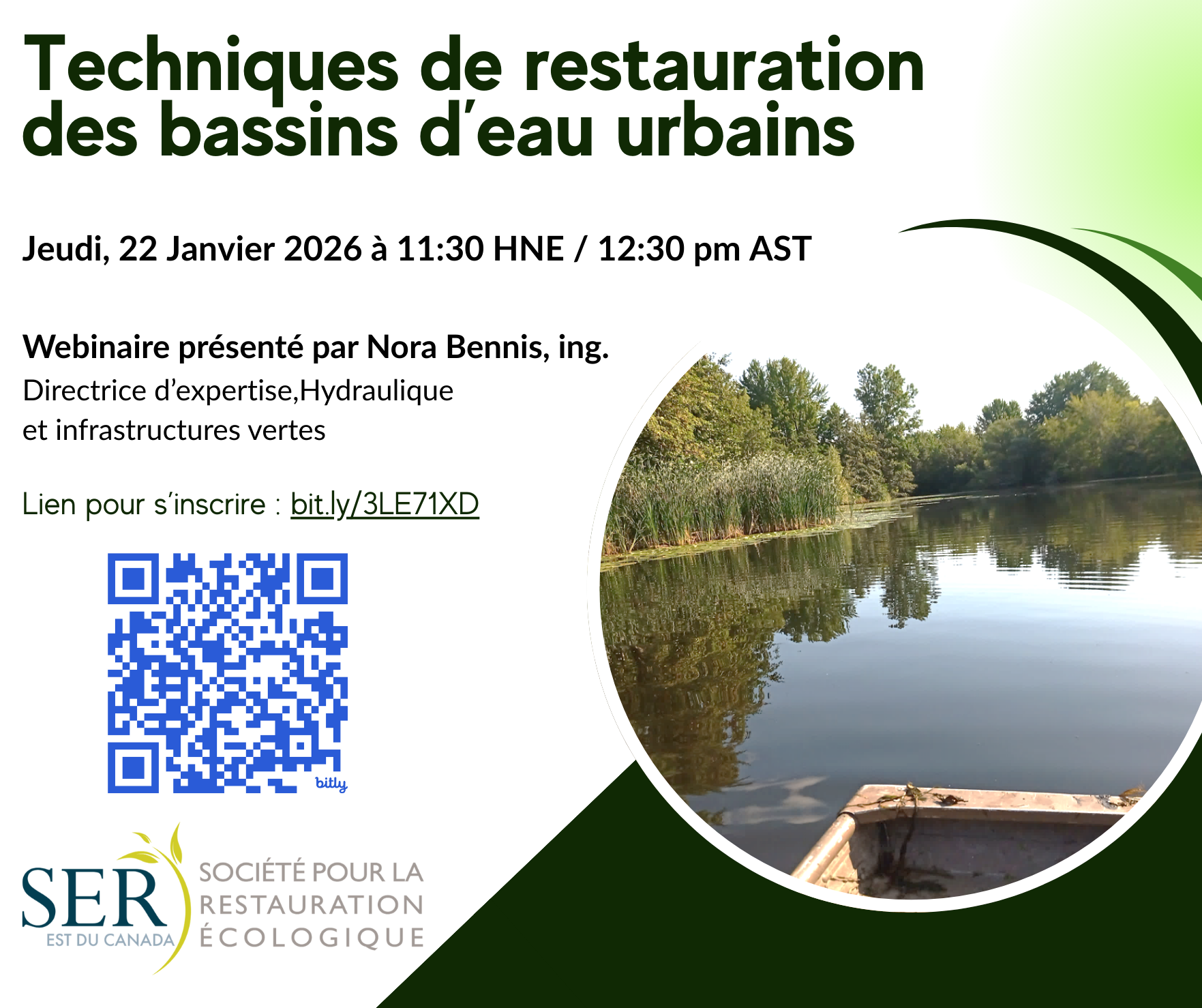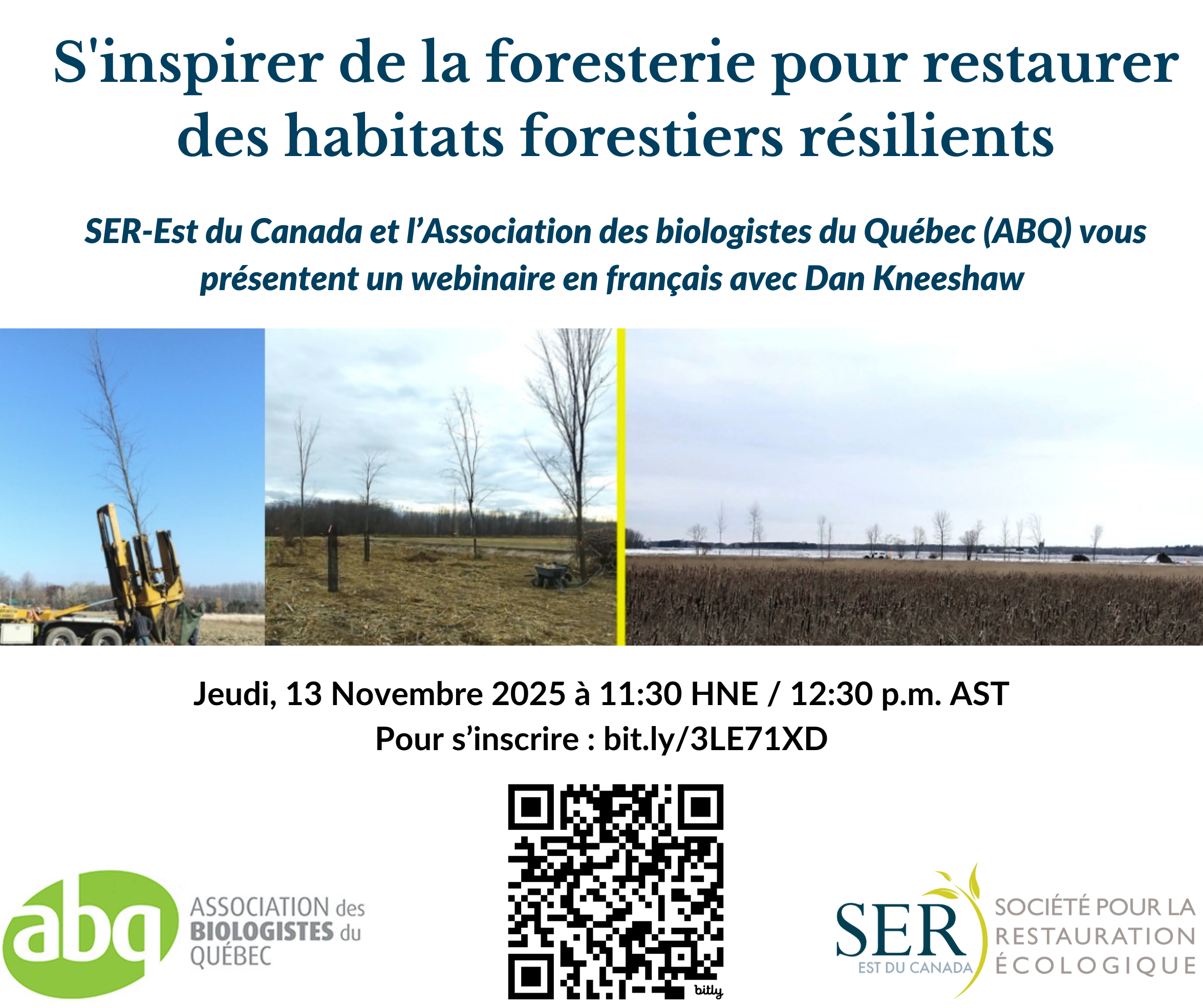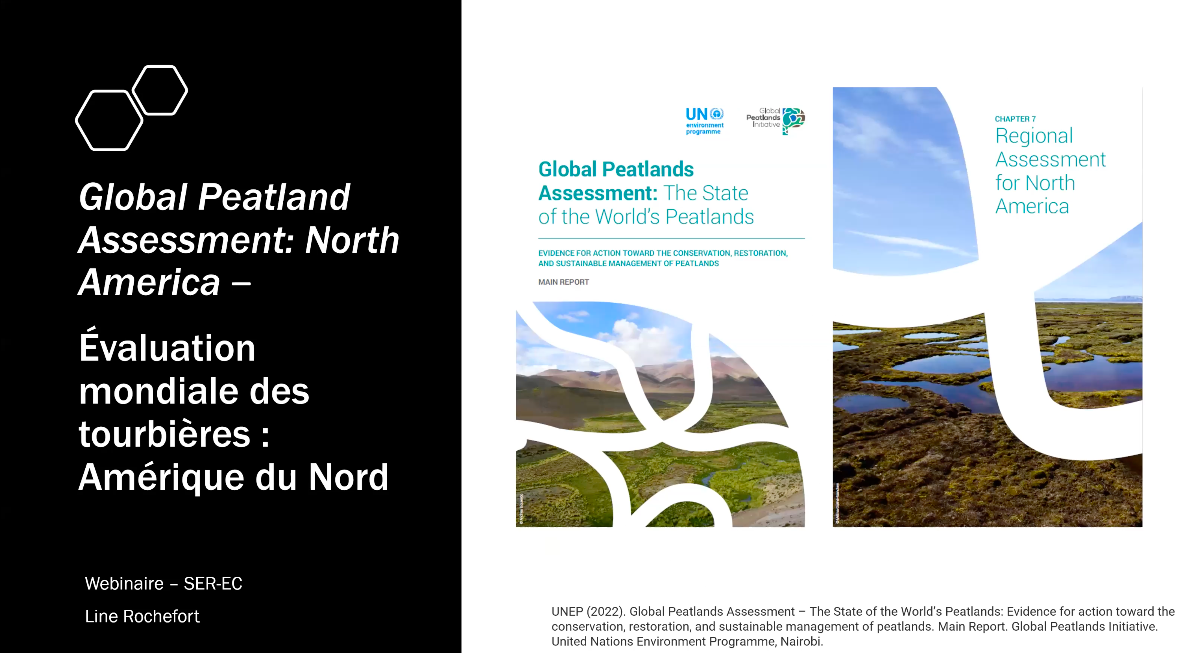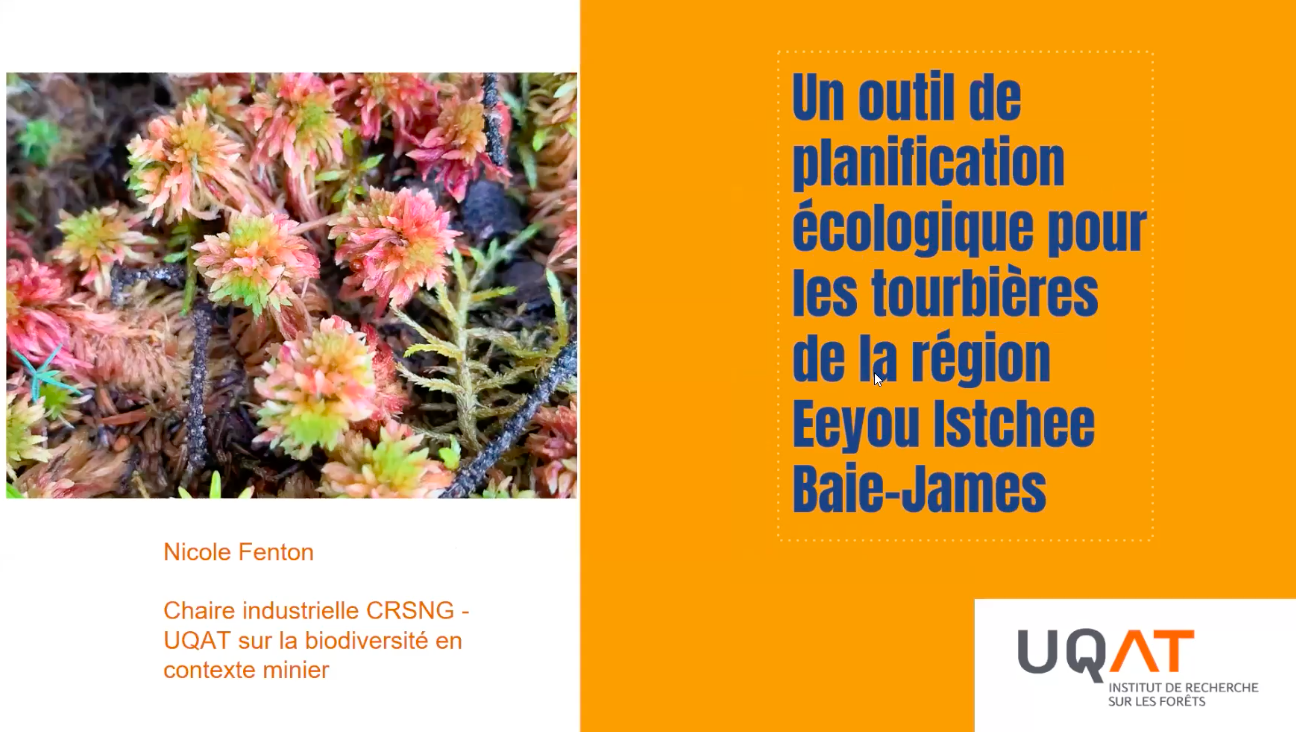Webinaires 2026
Les enjeux d’aménagement des berges
📅 26 mars 2026
🕦 11 h 30 – 12 h 30 (HE)
🔗 Lien Zoom pour s’inscrire: https://tinyurl.com/abnn4hzf
🎤 Conférencières :
Mélanie Glorieux, directrice de projet – associée, Rousseau Lefebvre
Mylène Chartrand, chargée de projet – associée, Rousseau Lefebvre
L’entreprise Rousseau Lefebvre œuvre en planification de milieux hydriques et humides depuis plusieurs décennies. Bien que la protection des milieux naturels soit aujourd’hui largement reconnue, elle demeure parfois un enjeu sensible dans la perception du public lorsqu’il est question d’interventions, notamment en ce qui concerne les accès, la visibilité et le traitement des berges.
Lors de ce webinaire, deux membres de l’équipe présenteront un aperçu de projets d’aménagement de berges en milieu urbain. Elles mettront en lumière les approches à privilégier et la méthodologie à adopter afin d’intégrer les notions de biodiversité et de services écosystémiques, ainsi que les résultats observés sur le terrain.
English
Challenges of shoreline design
📅 March 26, 2026
🕦 11:30 a.m. – 12:30 p.m. (ET)
🔗 Zoom Link for registration: https://tinyurl.com/abnn4hzf
🎤 Speakers:
Mélanie Glorieux, Project Director – Partner, Rousseau Lefebvre
Mylène Chartrand, Project Manager – Partner,Rousseau Lefebvre
Rousseau Lefebvre has been active in the planning of aquatic and wetland environments for several decades. While the protection of natural areas is now widely recognized, it can still raise concerns in public perception when interventions are proposed—particularly regarding access, visibility, and shoreline treatment.
In this webinar, two team members will present an overview of urban shoreline development projects, highlighting recommended approaches and methodologies to effectively integrate biodiversity and ecosystem services, as well as the outcomes observed in practice.
Webinaire | SER-EC et vous : accès à un réseau global de professionnels en restauration écologique
Date : Mercredi 11 février 2026
Heure : 11 h 30 HNE / 12 h 30 HNA
Langue : Français
👉 Lien Youtube pour visualiser la vidéo : https://youtu.be/mar1nJh-Le8
Présentatrice :
Pr. Line Rochefort, PhD, Université Laval, Co-présidente de la Société pour la restauration écologique – Est du Canada (SER-EC)
Description
La Société pour la restauration écologique – Est du Canada (SER-EC) est le chapitre régional pour le Québec et les provinces de l’Atlantique de l’organisme international Society for Ecological Restoration (SER).
En tant que membre, vous avez accès à un réseau de plus de 4 500 professionnels en restauration écologique provenant de plus de 100 pays, ainsi qu’à une riche bibliothèque de ressources et de documents de référence.
Ce webinaire présentera les avantages de l’adhésion à SER-EC, notamment :
-
La participation à des sorties de terrain, conférences, webinaires et formations
-
L’accès à des communautés de pratique couvrant une grande diversité de thématiques en restauration écologique
-
La possibilité de postuler à l’accréditation Certified Ecological Restoration Practitioner (CERP), reconnue à l’échelle internationale
-
Les opportunités d’échanges interdisciplinaires (biologie, chimie, géologie, ingénierie, océanographie, SIG et solutions fondées sur la nature)
Webinar | SER-EC and You: Access to a Global Network of Ecological Restoration Professionals
Date: Thursday, February 12, 2026
Time: 12:00 p.m. Eastern Time / 1:00 p.m. Atlantic Time
Language: English
👉 Youtube link to visualize the recording: https://youtu.be/fabwTkG7YNA
Presenter:
Pr. Line Rochefort, PhD, Université Laval, Co-chair of the Society for Ecological Restoration – Eastern Canada (SER-EC)
Description
The Society for Ecological Restoration – Eastern Canada (SER-EC) is the regional chapter for Québec and the Atlantic provinces of the global Society for Ecological Restoration (SER).
Membership provides access to a worldwide network of more than 4,500 ecological restoration professionals from over 100 countries, as well as an extensive library of reference materials.
This webinar will highlight:
-
Opportunities to participate in field trips, conferences, webinars, and training activities
-
Engagement in communities of practice addressing a wide range of ecological restoration topics
-
Eligibility to apply for the internationally recognized Certified Ecological Restoration Practitioner (CERP) accreditation
-
Interdisciplinary exchanges across fields such as biology, chemistry, geology, engineering, oceanography, GIS, and nature-based solutions
Lien pour visualiser l’enregistrement:https://youtu.be/ZLCxJ_tEtBE
2025 Webinars
Participez au prochain webinaire organisé par la SER-Est du Canada et l’Association des biologistes du Québec (ABQ)
🌲 S’inspirer de la foresterie pour restaurer des habitats forestiers résilients
📅 Jeudi 13 novembre 2025
🕦 11 h 30 (heure du Québec) – 12 h 30 (heure de l’Atlantique)
🎙️ Présenté par : Dan Kneeshaw
🔗 Lien Youtube: https://www.youtube.com/watch?v=Xv7WYHFSM6Q
Les changements climatiques entraînent des conditions futures incertaines, posant d’importants défis pour la restauration des écosystèmes.
Que pouvons-nous apprendre du domaine de la sylviculture et de son approche face à ces pressions sur les écosystèmes ?
Plus précisément, quels principes peuvent être utilisés pour créer des forêts plus résilientes, capables d’être rapidement colonisées par la faune ?
À travers des exemples concrets – réussites et échecs – issus de projets à grande échelle, ce webinaire mettra en lumière des concepts généraux et pratiques permettant d’améliorer la planification et la mise en œuvre des projets de restauration.
Webinaire du SER- EC Canada : La biodiversité et le non- déstockage du carbone : objectifs de réhabilitation des tourbières européennes grâce aux programmes LIFE
De 2022 à 2029, un nouveau programme européen, « LIFE Climat », vise à réduire les émissions de gaz à effet de serre (GES) issues de la dégradation des tourbières drainées. Grâce à des techniques similaires à celles du précédent programme, l’objectif est de restaurer 70 tourbières en bloquant 36 km de fossés de drainage et en reméandrant 18 km de cours d’eau. Les travaux s’effectuent dans des bassins versants à forte vocation agricole, parfois urbanisés, où technicité des projets et communication doivent aller de pair.
SER-EC Eastern Canada Webinar : Emerging Aquatic Connectivity Conservation Tools – The Canadian Aquatic Barriers Database and Canadian Aquatic Connectivity Assessment Webtool
We’re excited to announce that the Canadian Wildlife Federation (CWF) and the Nature Conservancy of Canada (NCC) have developed game-changing tools for aquatic conservation. Explore the comprehensive Canadian Aquatic Barriers Database (CABD)—an open, standardized national repository of aquatic barrier data—and discover the innovative Canadian Aquatic Connectivity Assessment Webtool (CACAW), a user-friendly online platform designed to restore natural water flows and enhance aquatic habitats.
Join our webinar to learn from twoexperts:
• Patrick Nussey – Manager, Conservation Science and Planning at Nature Conservancy of Canada
• Nick Mazany-Wright – Senior Spatial Ecologist at Canadian Wildlife Federation
Date & Time:
Thursday, May 8th, 2025 | 12:30 – 1:30 PM (Eastern Time) | 1:30 – 2:30 PM (Atlantic Time)
Youtube Link:
👉 The webinar is in English with AI-generated French captions available.
This webinar has been pre-approved for 1 CEC credit for CERP/CERPIT organized by the Society For Ecological Restoration (SER).
Thursday, February 19, 2025 Indigenous-led conservation and stewardship: An avenue to reconciliation and meaningful local and regional development with Valérie Courtois
Ms. Courtois will be exploring the evolution of Indigenous-led conservation and stewardship in what is now known as Canada; contextualize this movement within history, and demonstrate the partnership and allyship opportunities to practitioners and other organizations.
Valérie Courtois is the executive director of the Indigenous Leadership Initiative and a leading expert on the national movement of Indigenous-led conservation and stewardship building across Canada. The Indigenous Leadership Initiative is dedicated to strengthening Indigenous Nationhood as a path to fulfilling the responsibility to care for lands and waters. Courtois is a member of the Innu community of Mashteutiatsh, located on the shore of Peikuakamit in the heart of what is now known as Québec. She is also a registered professional forester who specializes in Indigenous issues, forest ecology and ecosystem-based management and planning. This webinar will be in English.
This webinar has been pre-approved for 1 CEC credit for CERP/CERPIT organized by the Society for Ecological Restoration.
Webinaires 2024
Wednesday, December 4, 2024 Native seed collection: myths and best practices.
https://us02web.zoom.us/webinar/register/1317308316095/WN_m-T61uIxTg24myTzjf70HA
Dr. Holly Abbandonato is a Plant Ecologist with Ducks Unlimited Canada (Atlantic), where she has worked since 2022. She earned her PhD in Earth and Environmental Science from the University of Pavia in 2017, following an M.Sc. from the Arctic University of Norway in 2014. She also holds three degrees from the University of New Brunswick: a BScENR in Environment and Natural Resources (2012), a BSc in Biology (2011), and a BA in Anthropology (2011). Dr. Abbandonato serves on the Steering Committee for Canada’s National Native Seed Strategy. Her current research focuses on salt marsh restoration and carbon sequestration in Atlantic Canada.
This webinar will explore the myths and best practices of native seed collection and use. Participants will gain insight into the key differences between agronomic and native seeds, highlighting how native seeds exemplify ecological resilience, foster biodiversity, and thrive in local ecosystems. This webinar will be in English with the option for AI-generated translated captions in French.
Le 10 octobre 2024 Pour définir et quantifier l’économie de la restauration écologique // Defining and quantifying the ecological restoration economy
https://us02web.zoom.us/webinar/register/9617266704137/WN_U-ioelrTRqqhzdh-F6dgQw
Nicolas Mansuy est un chercheur au Service canadien des forêts du Centre de foresterie du Nord (CFN) à Edmonton et professeur adjoint à l’Université de l’Alberta et à l’UQAT. Le webinaire sera en français avec des diapositives en français, option de sous-titres en anglais par IA.
Nicolas Mansuy is a researcher with the Canadian Forest Service of the Northern Forestry Centre (Edmonton) and an assistant professor at the University of Alberta and UQAT. The webinar will be in French with French slides, option for English subtitles using AI.
Le 15 février 2024 Création de milieux humides dans les bancs d’emprunt // Creation of wetlands in borrow pits
Joanie Tremblay et François Quinty – Géographes chez WSP // Geographers with WSP
Webinaire en français avec les diapositives en français // Webinar in French with French slides
https://drive.google.com/file/d/1Y9AaQRDJ_QSej-3pkr-v4Ljfz7E31QVu/view
Diapos : Création de milieux humides dans les bancs d’emprunt_JTFQ_VF
January 31, 2024 Ecological Indicators for Designed Ecosystems in urban contexts // Indicateurs écologiques pour les écosystèmes construits en milieu urbain
Alison D. Munson (PhD) – Professor and researcher, Department of Wood and Forest Sciences, Université Laval (Québec) // Professeure et chercheure, Département des sciences du bois et de la forêt, Université Laval (Québec)
Webinar in English with French slides // Webinaire en anglais avec les diapositives en français
https://drive.google.com/file/d/1ew5Tp2-6wdjO0mOaFVXY2Nrmd_mrQVqP/view?usp=sharing
Webinaires 2023
21 novembre 2023 Certification pour les professionnels de la restauration écologique
Karen Tekverk – Responsable du programme de certification – Society for Ecological Restoration
https://drive.google.com/file/d/1iVnTiyb8mdqQpWKkkNsubzvAiz2eEJVc/view?usp=sharing
17 octobre 2023 Webinaire SER-EC : L’état de santé des tourbières au Canada – Priorités de restauration
Line Rochefort, GRET, Université Laval
https://drive.google.com/file/d/1JfcPOYS_gCcdrgR3_aMob_xR6exdM8iu/view?usp=share_link
18 avril 2023 Webinaire SER-EC : Un outil de planification écologique pour les tourbières de la région Eeyou Istchee Baie-James
Nicole Fenton, Chaire industrielle CRSNG – UQAT sur la biodiversité en contexte minier
https://drive.google.com/file/d/1jKZzYAGCXVhUcXS6XsjmAFoQoMPp0fNo/view?usp=share_link
22 Mars 2023 Webinaire SER-EC : Programme de restauration et de création de milieux humides et hydriques
Sébastien Amodeo, Biologiste M.Sc., Coordonateur, PRCMHH
https://drive.google.com/file/d/1YWJrQcjUfe3zZfXytUk_Ti9SCPwAgox8/view?usp=share_link
Webinaires 2022
7 décembre 2022 Webinaire SER-CE : Compensation des zones humides en Nouvelle-Écosse – contexte réglementaire et étude de cas
Andy Walter, gestionnaire principal de projet et professionnel de la restauration des zones humides
https://drive.google.com/file/d/1FyxXIro7IA_HIqyXl8fUbCflwMGZsrQE/view?usp=share_link
Webinaires 2021
Titre: Faire de la place aux zones humides : En revue
https://www.transcoastaladaptations.com/news
Titre: The Nashwaak Greenway Project – Scaling up community-based restoration (Projet de voie verte de Nashwaak – Mise à l’échelle de la restauration communautaire)
Natalie Deseta, coordinatrice du projet, présentera l’approche communautaire de la Nashwaak Watershed Association (NWAI) visant à laisser de la place à la rivière et à restaurer et conserver les zones humides forestières de la plaine d’inondation indigène à Fredericton, au Nouveau-Brunswick. Le projet Nashwaak Greenway vise à accroître la résilience de la communauté dans un climat changeant – en augmentant la connectivité du paysage, en atténuant les inondations de surface locales, en fournissant un habitat critique pour les espèces aquatiques et terrestres indigènes, et en connectant les gens avec la nature grâce à la fourniture d’un espace vert récréatif qu’ils aident à restaurer et à gérer.














